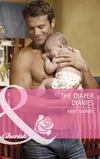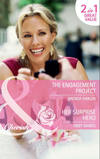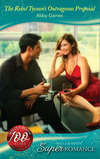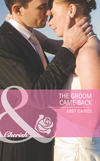Czytaj książkę: «The Diaper Diaries»
The Diaper Diaries
Abby Gaines
Table of Contents
Cover
Title Page
About the Author
Dedication
CHAPTER ONE
CHAPTER TWO
CHAPTER THREE
CHAPTER FOUR
CHAPTER FIVE
CHAPTER SIX
CHAPTER SEVEN
CHAPTER EIGHT
CHAPTER NINE
CHAPTER TEN
CHAPTER ELEVEN
CHAPTER TWELVE
CHAPTER THIRTEEN
CHAPTER FOURTEEN
CHAPTER FIFTEEN
CHAPTER SIXTEEN
EPILOGUE
Copyright
Abby Gaines wrote her first romance novel while still in her teens. Encouraged by her incredibly supportive parents, she wrote her novel longhand in school notebooks, supplying new pages daily to her biggest fan, her younger sister. When she’d finished, she typed up the manuscript and sent it to Mills & Boon and was shocked when they rejected it. To this day, no trace remains of that original work.
Yet after five years of submitting she sold her first Superromance. A few years ago Abby and her family moved out of the city to live on an olive grove. It’s beautiful, peaceful—and a long way from the mall. Contact Abby on abby@abbygaines.com.
For the Novelchicks: Karina Bliss, Sandra Hyatt and Tessa Radley. Wonderful writers and wonderful friends—I couldn’t have done it without you, gals.
CHAPTER ONE
THE LETTER ENDED the same way they all did. Thank you for caring.
“I’m too damn busy to care,” Tyler snarled at his secretary, who’d just deposited today’s stack of heartrending pleas for cash on the corner of his steel-and-glass desk.
“You always are,” Olivia Payne agreed cheerfully. With her graying hair held back in a bun, she looked staid and professional—an appearance that was entirely deceptive. She nodded at the letter Tyler held in his hand. “Anything interesting?”
Tyler fanned out the four pages of closely written text dotted with exclamation points. “Some guy wants two hundred grand to save the red-spotted tree frog. If we don’t act fast, we might never see the frog again.”
He picked up another letter—a single-page e-mail asking for thirty thousand dollars to buy computers for a preschool—and weighed it against the frog letter, as if he could somehow gauge the relative worthiness of the two causes.
The Warrington Foundation, whose purpose was to give away some of the multimillion-dollar profits earned by Warrington Construction, had hired extra staff in the new year to do the preliminary evaluations. It was their job to send polite rejections to the men who wanted bigger breasts for their wives and the people seeking donations to surefire lottery schemes.
But that still left anywhere up to a hundred potentially genuine requests for the chairman—Tyler—to read each day. Many of them ended with what seemed to be that mantra: Thank you for caring.
Tyler folded the first page of the frog letter into a paper airplane.
All he cared about right now was convincing the powers that be in Washington, D.C., that he was the right person to head up their new think tank, established to determine how charities and government could work together to support families. They were looking for someone who understood the concerns of ordinary American families. And Tyler had ended up on the shortlist thanks to the foundation’s good work with various children’s charities.
Presumably, he was at the very bottom of that shortlist. Yet he wanted the job to an extent that surprised him and would have amazed his family, who would doubtless say he was more suited to a think tank on how to get more fun into people’s lives.
Tyler flipped his hand-forged-silver Michel Perchin pen between his fingers as he contemplated his possibly irredeemable reputation. Every news report about his work at the foundation was countered by a juicy piece in the gossip pages about “playboy bachelor Tyler Warrington.” He’d made a major lifestyle adjustment—dating the same woman every night the past two weeks—but he wasn’t sure that act of heroism was enough. Correction: after the headline in this morning’s Atlanta Journal-Constitution, he knew it wasn’t.
He smoothed out the paper plane, slapped the two letters together, handed them to Olivia. “The frog’s a no go. Invite the preschool to pitch at the next committee meeting.”
What could be more ordinary and American than preschool?
Maybe his PR team could write an opinion piece about early-childhood education and submit it to the Journal-Constitution in Tyler’s name.
Olivia tucked the letters into her folder. “I’ll deal with these right after I go downstairs. Joe called to say there’s a delivery for you. He sounded pretty excited.”
“Just as well our security guy doesn’t make the allocations.” Unlike Tyler, Joe was a sucker for the attentiongetting ploys to which some people resorted when they asked for money. “If it’s balloons, cake or cigars, tell him to take them home to his kids.” He raised his hands in selfdefense against Olivia’s daggered look. “Okay, okay, hold the cigars.”
OLIVIA RETURNED carrying a faded green duffel bag in a fierce grip, the straps wrapped around one hand, her other arm underneath the bag. She cradled it with a delicacy that suggested its contents were at least as valuable as the Venetianglass sculpture she’d spent hundreds on last week.
Tyler shoved his chair back from the desk, got to his feet. “What is it?”
Very gently, she slid the bag across the surface of the desk; Tyler saw the zipper was open. “Take a look,” she invited, her voice curiously high.
He parted the top of the bag, peered in. And met the unblinking blue gaze of a baby.
Wrapped in a whitish blanket and wearing a soft yellow hat so that only a little round face showed…but definitely a baby.
“What the—” Tyler leaped backward, glared at his secretary. “Is this a joke?”
Olivia blew out a breath as she shook her head. “A young woman came in, told Joe she had a delivery for you. She excused herself to go to the bathroom and left the bag on Joe’s desk. After a couple of minutes, the baby sneezed—gave Joe a heck of a fright. That’s when he called me.”
Tyler raked a hand through his hair. “For Pete’s sake, the woman’s probably still in the bathroom. Or by now, back out with Joe and wondering where her kid’s gone. Take it back down.”
Olivia handed Tyler an envelope, his name written on it in blue ink. “This was in the bag.”
It had already been opened—Olivia read all Tyler’s correspondence. The paper crackled: thin, cheap, almost weightless. Yet it felt far heavier than those requests he’d been reading a few minutes ago. Tyler unfolded the page.
The handwriting was young, or maybe just uneducated, and the message brief.
Dear Mr. Warrington,
I know you are kind and generous and you help lots of people. Please can you adopt my baby? I just can’t do this. Thank you very very very much for caring.
No signature.
So much for the she’s-still-in-the-bathroom theory. Tyler read the letter again. Damn.
With a caution that would have amazed the college buddies he played football with every month, he advanced on the duffel. The infant was still there, still staring. It had worked one little hand loose and was clenching and unclenching a tiny fist against the blanket.
Hey, kid, if you’re frustrated, how do you think I feel? “What the hell am I supposed to do with you?” he said, the words rougher than he’d intended.
The baby blinked, and its mouth moved. If it cried now Tyler would be screwed. He patted the small hand as gently as he could, while he tried to think of words that might soothe. Snatches of nursery rhymes flitted through his head but were gone before he could catch them. “I meant heck,” he said at last.
The kid still looked worried, so Tyler moved out of its line of vision. He looked out the window, over Peachtree Street, where courier bikes scraped between cars and vans with no margin for error, and the crosswalks thronged with businesspeople. No place for a baby.
“We have to find the mother,” he told Olivia. “Ask Joe to send up the security-camera footage.”
“I already did, but he doesn’t think it’ll help,” she said, cheerful now she’d handed the problem to Tyler. “The woman wore a woolen hat pulled right down, and she had a scarf wrapped around her face. It’s cold out, so Joe didn’t think anything of it.”
“Someone has to know who she is,” Tyler persisted. “We’ll give the tape to the police. And you’d better call social services—they can take the baby until the mom turns up.”
“And they say you’re just a pretty face,” Olivia marveled. “I don’t know why that young woman didn’t go to social services in the first place.” She chuckled. “I mean, do you know anyone less suited to looking after a baby than you?”
“You,” Tyler returned sharply. Stupid to let her “pretty face” comment needle him. He might not be an expert on diapers and drool, but he knew he could do whatever he set his mind to. And that made him good for a whole lot more than simply doling out the money his brother Max made in the family’s “real” business. Which he was about to prove by winning the job in Washington, D.C.
Olivia, who’d never married, never had kids, and as far as Tyler knew, was having too much fun to regret either omission, laughed at his insult.
She didn’t know about Washington. She and Tyler’s mom were close enough that there was no chance she wouldn’t spill the beans. No one knew, not even Tyler, officially. The news that he was under consideration had come from his cousin Jake, who had reliable political connections. But the whole thing was so sensitive, so confidential, there was no way Tyler could do what he knew would work best—jump on a plane to D.C. and talk them into giving him the job.
All he could do was continue his strategy of raising his profile in the media—his political profile, not his social profile. He glared at the duffel from his safe distance.
“The press will be all over this,” he told Olivia, “no matter how fast we palm the kid off to social services.”
“It can’t be as bad as today’s story.” She ruined the comforting effect by snickering.
Two women Tyler had dated in the past had gotten into a tipsy argument at a nightclub a couple of evenings ago, apparently over which of the two he’d liked best—he barely recalled either of them. In a misguided attempt to emphasize her point, one had slugged the other with her purse.
None of that would have made the newspaper if one of the women’s pals hadn’t posted the purse for sale on eBay. The purse had been of supreme disinterest to most of the world, but the bidding in Atlanta was fierce and the story had spread in the media as one of those quirky “I sold my grandmother on eBay” tales. Tyler could only hope it hadn’t reached Washington.
He needed damage control, and he needed it now. Pacing in front of the window, he tried to think of a political angle he could play up with the baby that might counter the gossip. How about a photo opportunity of him handing the baby to social services, commenting about the challenges facing young mothers?
Then it hit him—or, rather, smacked him in the head with a force that left him dizzy.
There wasn’t just one political angle to the baby story, there were dozens—the foster system, parenting, money, infant health, who knew what else?—that he could tap into. This was his chance to show the world how well he understood the concerns of families.
“On second thought, don’t call social services,” he told Olivia. “Nor the police.” He grinned at the duffel, suddenly feeling a whole lot warmer toward its occupant. “We need to get the baby out of the bag.”
“We?” she said, horrified.
“You,” he amended.
She backed off. “Uh-uh, no way.”
Tyler directed his most cajoling smile at her. “Please.”
She rolled her eyes, but came back and reached into the bag. He steadied it while she lifted the baby out. Olivia held it in a grip that he judged possibly too tight, but the baby didn’t protest, so Tyler bowed to its superior knowledge. He looked around his office, all hard surfaces, sharp corners, glass and metal. “How about we spread the blanket on the floor,” he suggested, pleased with his own parental-improvisation skills.
He managed to get the blanket out from around the baby, who turned out to be encased from head to toe in yellow terry. “We’ll use your office,” he told Olivia.
“My floor has slate tiles.” With the unnaturally pointed toe of her shoe—and with undisguised triumph—she nudged the plush rust-colored carpet that enhanced Tyler’s luxurious work space. “Yours is much more suitable.”
Too bad she was right. He spread out the blanket, smoothed it confidently—because looking after a kid wasn’t rocket science—then nodded at Olivia, who knelt down to lay the baby on its back. She rubbed her own back as she got to her feet. “Now what?” she said.
Tyler looked down at the infant. Two short, pudgy arms waved at him, but there was still no crying. Thoughtful of the mom to give me a well-behaved kid. “You’d better organize a crib or whatever it is babies hang out in.”
“You can’t be thinking about keeping this child,” Olivia said, shocked.
“Of course not. Just until we find the mom.” At least a few days, he guessed, even if he put a private investigator onto it today. Maybe as much as a week or two. He would call his PR manager, tell her to arrange some media opportunities for him right away—just as soon as she found someone to get him up to speed about kid-parent issues.
“But—” Olivia shook her head, nonplussed “—you don’t know the first thing about looking after a baby.”
“That’s what sitters are for. Call an agency, see if you can get someone immediately.”
“I didn’t even know you liked children.” She was practically wringing her hands with worry, which Tyler considered an overreaction.
“I only have to like this one.” He didn’t even have to do that, but he was willing to try.
Olivia picked up a pad and pen off the desk. “Then I guess we need to think about food. Special baby formula.” She jotted that down. “And diapers. They go through those pretty fast.” She shuddered.
The baby hiccuped, its face contorted. Hell, was it about to puke? They did that all the time, didn’t they?
“We should call a doctor,” Tyler said. “Find out if the kid’s okay before I make any plans.” He pulled out his handkerchief in case of an emergency wipe-up situation. “Call that woman we gave money to last year. The pediatrician doing the kidney research.”
“Great idea.” Olivia’s voice warmed. “She’s a real peach.”
Tyler frowned. “Are we talking about the same woman?”
“Dr. Bethany Hart.”
“That’s her.” He would have described Bethany Hart as more frosty than peachy. And she was quite possibly the most ungrateful woman he’d ever met. The Warrington Foundation had granted her a generous sum for her research into childhood kidney disease which was part of a wider research project at Children’s Healthcare of Atlanta, attached to Emory University. Instead of the thank-you letter most people wrote, she’d sent Tyler a curtly worded missive to the effect that if he was at all serious about helping young kidney patients he would give a lot more money.
Unlike everyone else, she’d accused him of not caring. Tyler had found her ingratitude refreshing.
Just a couple of weeks ago she’d written to him again. The money, intended to cover her salary, along with admin support and the use of lab facilities and equipment, was almost gone: she’d asked him to renew her funding. She’d enclosed a comprehensive—in his opinion, boring—report on her work to date, and had invited him, rather insistently, to visit a bunch of sick kids in the hospital.
“She may not be your biggest fan,” Olivia said with rare diplomacy. She’d read the pediatrician’s letters, too. “But she sure loves kids.”
Tyler had noticed the way Dr. Hart’s blue eyes lit up when she talked about the children she worked with. “Then she’ll want to check out this baby.”
He didn’t plan to give her a choice. Bethany Hart might have complained about the amount of money she’d received, but no one else had offered her a dime. The foundation had given more than her presentation to the Philanthropic Strategy Committee had merited.
Tyler had swayed the PhilStrat Committee in her favor. Not because she’d wowed him with her presentation—despite her obviously high intelligence, she’d been inarticulate to the point where he’d been embarrassed for her. Definitely not because of that spark of attraction that had flared between them, despite her frostiness—he never let that kind of thing get in the way of business.
When she’d bumbled to the end of her appalling pitch, she’d shot Tyler a look of angry resignation that said she might have messed up, but it was his fault.
He shook her hand as she left, and couldn’t help smiling at the furious quiver in her otherwise stiff fingers. Which enraged her further. She looked down her nose at him as she said, “You haven’t heard the last of me.”
He sighed. “I was afraid of that.”
She reeked of do-gooder earnestness, coupled with the kind of instinctive, misguided courage that led people to pursue hopeless causes without, unfortunately, actually losing hope.
So Tyler had believed Bethany when she said he hadn’t heard the last of her. During the PhilStrat Committee’s deliberations, he’d cast his vote in her support largely to shut her up.
Now, as it turned out, that might have been a smart move. He needed her discreet cooperation over this baby and he expected her to give it, however reluctantly.
Because Bethany Hart owed him.
CHAPTER TWO
BETHANY WAS IN THE SHOWER sloughing off the fatigue of three straight shifts in the E.R. at Emory University Hospital when the phone rang in the studio apartment she rented near the campus.
It was Olivia Payne, Tyler Warrington’s secretary, asking if Bethany could come to the Warrington Foundation offices right away. “Tyler would like to meet with you.” Olivia paused. “At this stage I can’t tell you why.”
He wants to give me more money. Jubilation surged through Bethany; adrenaline transformed her exhaustion into energy. She punched the air with the hand that wasn’t holding the phone, then had to clutch the towel she’d wrapped around herself before it slipped to the floor.
After she’d hung up, she celebrated with an impromptu dance around her living room singing, “I aaaaam a reeesearch geeenius” to the tune of Billy Joel’s “Innocent Man.” But the room was too small for her to burn off this much excitement: as she danced, she grabbed the phone again and dialed her parents.
“Mom, it’s me. Bethany.” She slowed down, suddenly breathless. Crazy that she still felt compelled to identify herself—it was fourteen years since her sister’s death, there was no chance of confusion. Without waiting for a reply, she said, “Looks like the Warrington Foundation plans to extend my research grant.”
Her mom squawked with delight, none of her usual listlessness evident. “Darling, that’s wonderful. Just wonderful.”
“I’m seeing Tyler Warrington this morning. The foundation can extend the grant for a second twelve months at its discretion, without me having to pitch again.”
“That’s the best news—let me tell your dad.”
Bethany heard her mom calling out to her father, heard his whoop of excitement. Then a muffled question she didn’t catch, and an “I’ll ask her” from her mom.
“Uh, honey,” her mother said into the phone, “is there any chance they’ll give you more money than last year? You always say you could get so much more done if you could afford to pay your assistant for more hours.”
The familiar defensiveness—the urgent need to impress upon her parents that there just wasn’t enough money around to fund all the research into kidney disease—constricted Bethany’s chest. She puffed out a series of short, silent, relaxing breaths. Her parents weren’t worried about other projects, only about hers. She understood; she even sympathized. Brightly, she said, “Of course I’ll ask for more, but I may not get it.”
Mentally, she doubled the figure she would propose to Tyler Warrington. If she started high, even ridiculously high, chances were she’d end up with more than if she went in low.
“I know you’ll do your best,” her mother said warmly.
Bethany basked in that praise. No use telling herself she was too old to be grateful for the crumbs of parental approval that came her way; some things never changed.
The moment she’d finished the call, her phone rang again. It was Olivia. “I forgot to say, you’ll need to bring your medical bag.”
Bring her bag so Tyler could hand over a check? Uh-oh. A chill shivered through Bethany, the kind that either meant she was ill or something bad was about to happen. And in her own expert opinion, she wasn’t ill.
Should she call Mom now and admit she might have been hasty with her talk of more money? Her finger hovered over the phone’s redial button.
Then her natural optimism took over, binding itself to the remains of that energy surge. Okay, so Tyler likely had a nephew or niece with a chest cold, and His Egoness figured he had dibs on Bethany’s time now that he’d contributed to her research. But if he didn’t plan to renew her funds, surely he wouldn’t dare summon her help? And that report she’d sent a couple of weeks ago had made an excellent case. Whatever he wanted today, she could still talk to him about money.
Provided, of course, she could string together more than two coherent words. As always, the recollection of how she’d mangled her last pitch to the super-smooth Tyler mortified her. No matter how often she prayed for selective amnesia—either for her or Tyler—her memory stayed depressingly clear. His was doubtless just as sharp.
But with any luck, he was so hopelessly in love with his new girlfriend—according to the newspapers, he was embroiled in a hot-and-heavy romance with Miss Georgia—that he’d see everything, including Bethany, through rose-tinted lenses.
“All you have to do is stay calm,” she told herself out loud as she fished through her wardrobe for something to wear. Last time, she’d borrowed a suit from a colleague, but Banana Republic navy chino hadn’t stopped her messing up.
She tugged a burgundy-colored woolen skirt off its hanger. Maybe she’d have better luck with this—unmistakably homemade, it was a gift from a young patient’s grateful grandmother. If anything could fire Bethany up to get more money from Tyler it would be a reminder of the kids she hoped to help. She pulled the skirt on, added a long-sleeved black T-shirt, then inspected herself in the mirror.
Hmm, maybe the skirt was a bit too peasant style, with those large felt flowers appliquéd around the hem, and—she twirled around—maybe said hem wasn’t entirely straight—the old lady’s eyesight had been failing—but Bethany’s highheeled pumps would dress it up.
Besides, she didn’t have a lot of choice. Thanks to her huge student loans, her wardrobe consisted of scrubs, lab coats and a bunch of stuff she could hide beneath them.
Bethany waved the blow-dryer briefly at her shoulderlength reddish-brown hair, then, in deference to the importance of the funds she was about to request, not to the man who was to bestow them, she applied some mascara and a pinky-red lipstick.
“Calm,” she reminded her flustered, wild-eyed reflection as she rolled her lips together to smooth the lipstick.
She couldn’t afford to screw up again. Last time, Tyler hadn’t bothered to hide first his boredom, then his amusement at her inarticulateness. Then, of course, he’d done that stupid thing that had left her feeling like the joke of the day.
Maybe she’d been oversensitive, she chided herself. There was probably a good explanation for his behavior. A nervous tic. Tourette’s syndrome. Thirty-something years of silver spoon-slurping, privileged existence that had blinded him to the needs of—
Okay, now she was being uncharitable, the very thing she’d accused Tyler of in the letter she’d sent after her pitch. Besides, Miss Georgia was apparently committed to working tirelessly for world peace. Clearly Tyler’s charitable instincts were in full working order.
Bethany would give him the benefit of the doubt and ask him politely—and coherently—for more money.
OLIVIA PAYNE GAVE Bethany a warm welcome, then phoned through to tell Tyler she had arrived.
When he appeared in the doorway of his secretary’s office, Bethany was struck anew by his good looks. The camera loved him—she knew that from the newspaper photos—but real life suited him even better. She might not like the guy, but she’d have to be blind not to notice he had dark hair just too long for decency and when he smiled, as he was doing now, his eyes gleamed with a dare that plenty of women might be tempted to accept.
She doubted anyone could consistently achieve a smile like that without hours of practice in front of a mirror.
“Good morning, Dr. Hart.” His voice was part of the package, low and warm, as if she was the person he most wanted to see right now.
Poised, calm, smooth, she cautioned herself. She shook his hand firmly, noted the gold links that punctured the crisp white of his cuffs. In his immaculately tailored charcoal suit he looked more put together than a GQ cover, and for some unspecified, illogical reason, Bethany disapproved. “Good to see you again, Mr. Warrington—Tyler.”
“How is your research going?” he asked courteously.
“Quite well, given the funding shortfall.” Not subtle, but definitely articulate.
His lips twitched. “That shortfall would be my fault, I assume?”
“Nothing you can’t rectify,” she said encouragingly, and he chuckled outright. Was he laughing at her again? She plowed on. “As you’ll have seen from my report, I’m on the verge of a breakthrough into therapies that interfere with antibody production. If the foundation would consider—” she thought of her parents, drew a shaky breath “—tripling its investment in my work, there’s every chance—”
“I didn’t ask you here to talk about your funding.” His interruption confirmed her fears, sent her spirits into free fall. Bethany clenched her toes inside her shoes to counter the sagging of her knees. Less abruptly, Tyler continued, “But if you want to call Olivia next week and ask her to set up a time in my diary…”
Bethany’s hopes shot back up again. Her first instinct was to grab the opportunity he offered. Then he favored her with that calculated smile that seduced socialites and beguiled beauty queens. And distracted Bethany? Not this time. She folded her arms and said deliberately, “And what will Olivia say when I call?”
Tyler blinked. Olivia made a strangled sound. Bethany waited.
Then he grinned, something much more genuine—as if to say, “You got me.” “She may say there’s no room in my diary,” he admitted.
“Just like there was no room for you to visit the kidney patients I work with?”
“I have a lot of demands on my time.” He spread his hands disarmingly. “You wouldn’t believe the number of people who want a piece of me.”
Most of them female. Even before Miss Georgia, the newspapers had reported his dating exploits so comprehensively, Bethany wondered how he found time to make it into the office. But evidently he did, because lately the press had been covering the foundation’s charitable activities, and in that sphere, at least, it seemed Tyler was a saint. Albeit one untroubled by anything so pesky as a vow of celibacy.
“I want a piece of you, too,” she said. Tyler raised his eyebrows, and she stuttered, “I—I want you to guarantee me that appointment to talk about my funding. Please.”
For a long moment Tyler stared at her. Then he said, “I like a woman who knows what she wants.” Before she could decide if he was being provocative, he turned to Olivia. “Give Bethany some time next week. And when I tell you to fob her off, don’t listen to me.”
That frank admission of his lack of interest in her work floored Bethany…and, amazingly, made her want to laugh. Which she was not about to do: she took her work seriously, even if he didn’t. She compressed her lips, picked up her bag. “Olivia asked me to bring this. I assume there’s a patient you want me to look at?”
“In my office.” He held the door open for her.
Tyler figured it was the oddness of Bethany’s skirt that drew his attention to the neat round of her bottom as he followed her into his office. That, and the same kick of awareness that had surprised him at their last encounter.
He couldn’t think why he found her so intriguing. Yes, that polished-cherry-wood hair waved nicely around her heartshaped face. But her nose was too pointy, all the easier for her to look down it at him, and her mouth a trifle wide for that stubborn chin. She was pretty, but Tyler dated beauties.
He was still puzzling over his attraction to her when she stopped; he almost bumped into her. She’d seen the baby.
“Oh, you gorgeous little thing.” She sounded awed, breathless, as she dropped to her knees on the carpet. “Hello, precious,” she crooned. The baby’s face split in an enormous smile, and Bethany laughed out loud.
Humor widened her mouth to even more generous proportions and revealed a dimple in her chin. All trace of obstinacy vanished, and she was much more the peach Olivia had suggested. A cute-but-not-his-type peach. Women who went gaga over babies usually had him hightailing it out the door.
Darmowy fragment się skończył.





















